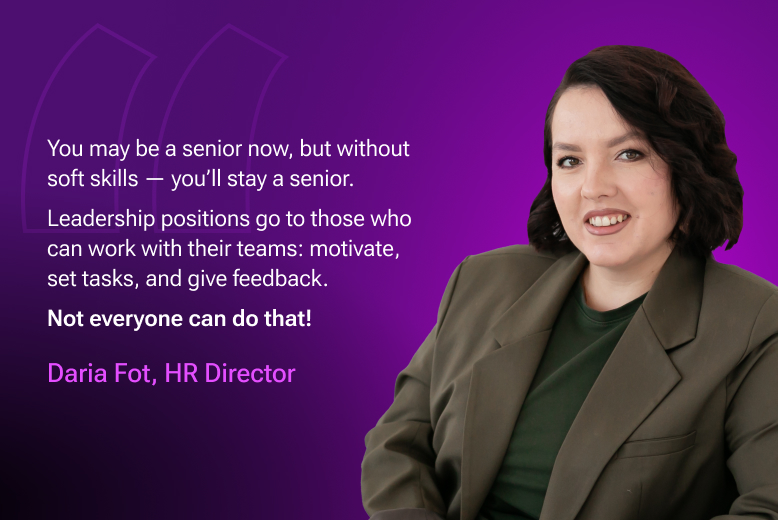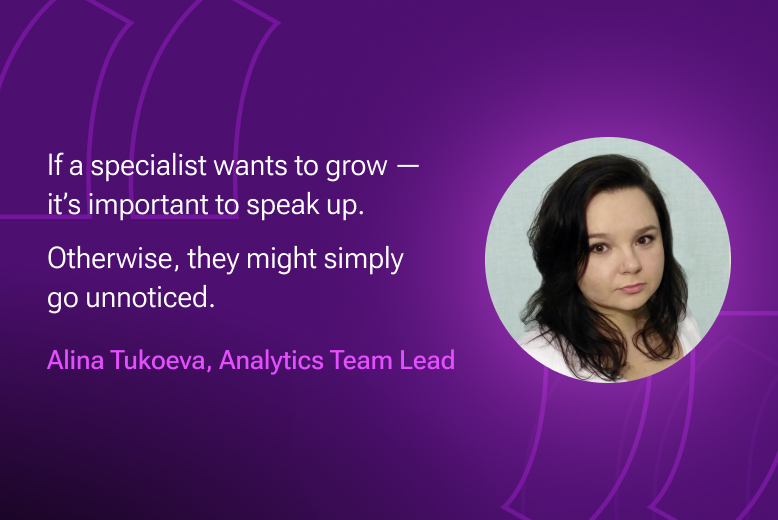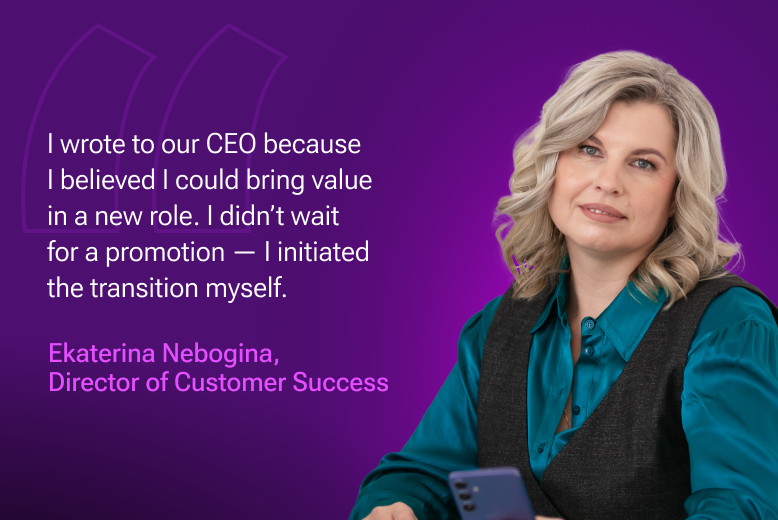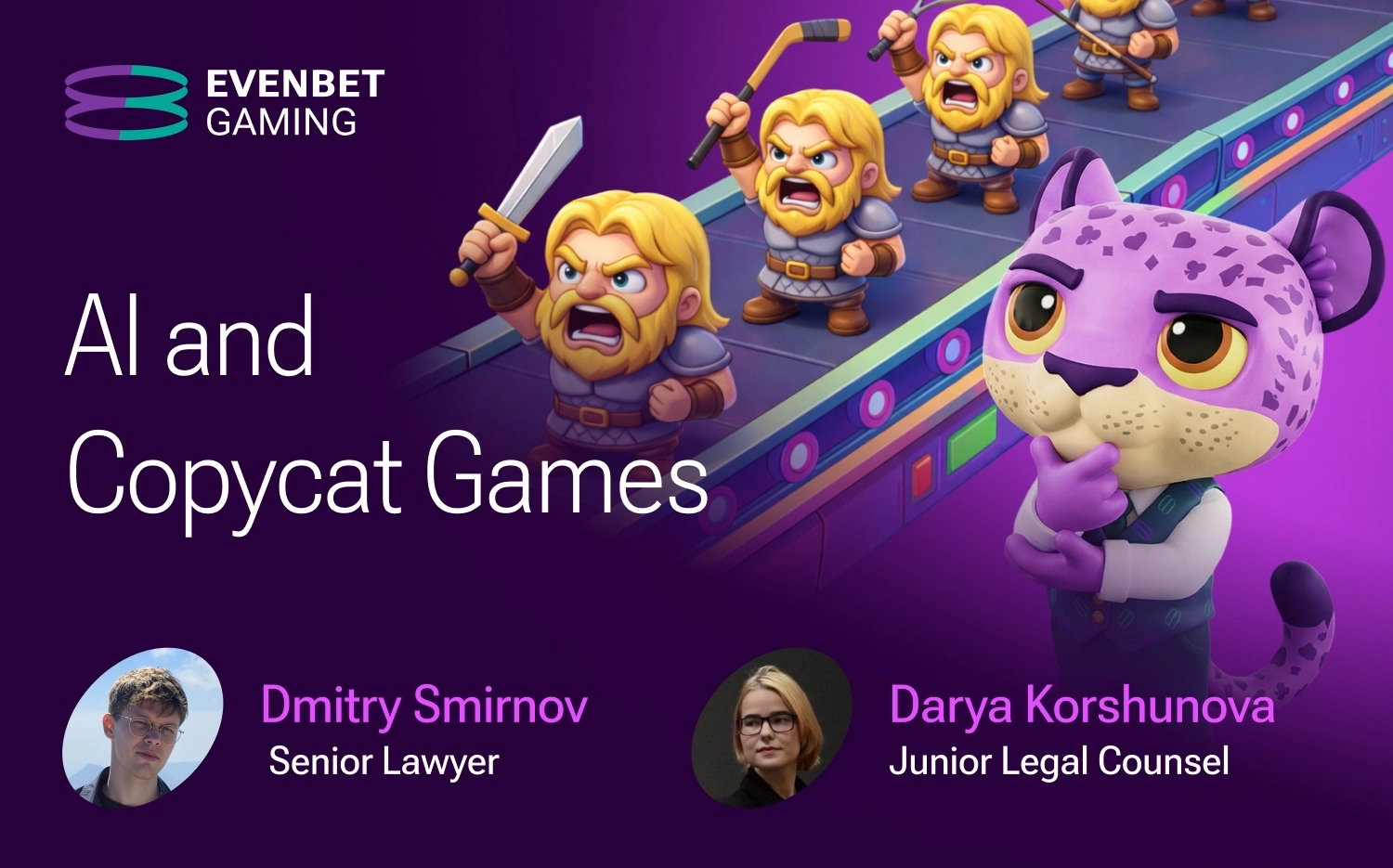
Daria Fot, Human Resources Director at EvenBet Gaming, shares her insights on the skills and qualities needed for successful career advancement in the dynamic field of iGaming. Spoiler alert – don’t forget about soft skills!
Important Skills and Qualities
Employees at EvenBet Gaming are selected based on their soft competencies – also known as transferable skills. These qualities enable a person to thrive within the company. Of course, hard skills are important too – such as knowledge of specific software or deep technical expertise. However, your success will largely depend on your soft skills: communication abilities, problem-solving capabilities, adaptability to circumstances, and finding solutions. The iGaming industry evolves at an incredible pace, so one of the key characteristics of workers in this field is their ability to adapt and be flexible in a changing environment.
Evaluating Employee Success
An employee striving for career achievements at EvenBet Gaming must align 100% with corporate values, embody them, and serve as a role model. This is paramount! At the same time, each role at EvenBet Gaming has its competency maps that employees must meet depending on their position; there are clear qualification requirements for everyone. These requirements include both hard competencies, such as experience with specific software or systems, and soft ones. For instance, if you are in a junior position, it is not as crucial to be able to set tasks or delegate responsibilities. But for seniors, this becomes essential. However, if you are a tester with evident abilities in soft skills and a desire to advance your career, then it is entirely possible.
Changes in Skill and Technology Requirements
The skill and technology requirements for developers in iGaming are constantly changing! For example, recently we hired someone from outside who quickly left us; this prompted us to conduct a retrospective to understand what went wrong—perhaps there was a mismatch with market expectations—and then we adjust our competency maps accordingly. This is not a static process; the maps are continuously developed and refined. It is important to respond quickly to market demands while aligning these innovations with EvenBet Gaming’s goals.
Opportunities for Professional Development
EvenBet Gaming has strategic goals that cascade down through each department; each department undertakes initiatives that help us achieve our objectives. If a particular specialist lacks certain skills necessary for their tasks, we will certainly include them in training programmes or send them for further education. We also regularly conduct management courses; even if an employee has only one subordinate, they must undergo this programme several times. If an employee expresses interest in learning something new, they can approach their manager about it. We often see situations where employees transition from one area to another; for example, layout designers become programmers. We provide both internal and external training.

Unexpected Qualities for Career Growth
I advocate for a systematic approach. Sudden leaps or spikes are not always ideal; it’s akin to someone unexpectedly winning a million without being prepared for it—often they do not hold onto that money for long. When someone gradually works towards earning an amount over time, they tend to manage it wisely. I compare this scenario with sudden career jumps; if you manage to have coffee with the CEO and share something interesting only to soon after be promoted without significant achievements behind you—I doubt such individuals will last long in their new roles without truly valuable contributions! However, sometimes random encounters or unexpected skills can indeed facilitate career growth—for instance, someone with entrepreneurial experience may possess strong communication abilities and resilience under stress, which can positively influence their career trajectory! We’ve had such cases within EvenBet Gaming.
Mistakes on the Path to Career Growth
Often people become so engrossed in their professional duties that they neglect building connections across various levels of management within EvenBet Gaming. They primarily interact with colleagues or subordinates when it is crucial for advancement not only to be strong specialists but also to establish relationships between departments. Moreover, being able to effectively present your work is vital; many people work well but ultimately those who can demonstrate their results—regardless of how impressive they may seem—usually come out ahead. The mistake lies in not doing this while hoping that management will notice your achievements on its own. It’s also important for specialists at EvenBet Gaming to understand what is happening with similar roles in other companies so they can regularly benchmark themselves against industry standards—not just financially but also regarding job responsibilities and trends within their field. Failing to stay informed about developments beyond one’s company or desk today is unacceptable.
Overall trends show that currently 90% of managers within EvenBet Gaming have risen through the ranks from ordinary employees; many joined us straight from university and now have been here over 30 years—they’ve grown alongside EvenBet Gaming. While some were initially talented programmers, they have also developed managerial and soft skills along the way. I reiterate: effective communication is crucial if you wish to climb the corporate ladder! You may be senior now but will remain so without soft skills; leadership positions will be occupied by those who can work with their teams—motivating them while staying informed—setting tasks while providing constructive feedback—and not everyone possesses these abilities! Another important point of personal significance for me: EvenBet Gaming has many women managers—I’d say it’s about 50-50 at the C-level! This speaks volumes about our company’s journey.
Success Stories: Alina Tukoeva & Ekaterina Nebogina
Alina Tukoeva, Analytics Team Lead:
My journey with the company began in 2015. By that time, I had already finished university and gained experience working as an analyst in another company. Before EvenBet Gaming, I had also worked in a few other places, but it was here that I truly found my place. I started as a tester and now hold the position of Head of Analytics. Over these ten years, both I and the company have gone through significant changes.
The transition between roles was gradual. After my role as a tester, I worked as an analyst for a while, which became an important step in my professional development. When reflecting on the factors that influenced my career, I would highlight responsibility, proactivity, and communication skills. These qualities helped me stand out. To progress in your career, it’s not just technical skills that matter, but also soft skills.

If a specialist wants to advance, it’s important to express their intentions. Otherwise, they risk remaining unnoticed. Many hesitate to speak up, fearing others might think they are trying to take someone else’s position. However, it’s through proactivity and openness to new opportunities that one gets noticed.
My transition to my current role wasn’t unexpected. I had prepared for it, although initially, I wasn’t entirely sure what was required of me. The company has been growing quickly, and structures have been evolving. Naturally, during this period, balancing the responsibilities of both an analyst and a leader was challenging. But despite the difficulties, this experience was invaluable.
Looking back, I see how much has changed over these ten years. This journey has been exactly what I was seeking. I’m proud of my contribution to the company’s development and look forward to the new challenges and growth opportunities ahead.
Ekaterina Nebogina, Director of Customer Success Department:
– My journey with the company started over ten years ago. In 2011, when our team merged with EvenBet Gaming, I took on the role of Head of Sales. We were involved in the development of software components for developers — tools that made working with large and complex applications easier. Even then, I understood that it was not just about “selling a product,” but about understanding how it worked and how it could benefit the client.
I’ve always sought to understand the technical side of solutions, the business objectives of our customers, and how we could be strategically useful. This desire to understand, to find cause-and-effect relationships, and to see the bigger picture helped me grow further.
Over time, it became clear that the development of components was losing its relevance. So, in 2019, I made a significant step and transitioned to a new role in a different business area, becoming Account Manager. This was a shift to a zone where I had to learn quickly, adapt, take on a lot of responsibility, and at the same time remain flexible. I initiated the transition myself — I wrote to our CEO, Dmitry Starostenkov, because I believed I could be useful in this new role.

Initially, I worked in account management: handling clients, understanding their needs, and helping the team deliver projects effectively. But over time, my responsibilities grew — I began onboarding new employees, participating in recruitment, assisting in process building, and documenting procedures. It was a very organic process, I felt like I was “growing” into management — not by formal appointment, but because of the nature of what was happening.
In 2021, with the formation of a new structure, I became Head of Customer Success. We became an independent unit, merging Customer Support, account management, documentation, and operational efficiency. This was no longer just about projects or client focus; it was a comprehensive, system-wide approach to service quality, processes, and team growth.
To match the new level, I decided to study — I took a leadership course. This education became the “push” that allowed me to fully shift from operational work to management: intentional, thoughtful, focused on developing people and business outcomes.
In 2024, I was appointed Director of the Customer Success Department. Now, my responsibility is the strategic development of the department, supporting team leaders, and fostering the growth of the entire team. We are focused on efficiency, business results, and increasingly shifting our focus towards proactive customer service.
What helped me to navigate this journey?
First and foremost — engagement and internal motivation. I never viewed my job as just completing tasks. It was always important to me to understand: how is the product structured, how is the client’s business structured, where can we add value, and where can we strengthen the relationship? This desire to “dive deep” into everything helped build trust — both inside the team and externally, with clients.
Also, the ability to learn quickly, analyse, organise information, and share it effectively. These skills were especially helpful during the onboarding of new employees and the creation of internal materials such as checklists, guides, and handbooks.
Communication and empathy played a major role as well. I know how to build relationships, listen to people, and notice signals even when they are not explicitly stated. This is crucial both when managing a team and in customer relationships. Emotional intelligence has become an integral tool here.
Another strength has always been initiative. I don’t wait to be told what to do. If I see that something can be improved, I propose it. If I understand that I can take on more responsibility, I do it. Even if at first, I’m uncertain or unclear about the process — I move forward, learn, try, and speak up.
There were also challenges along the way. The most difficult period was when, while still part of the technical department, I was already expected to take on initiatives, make decisions, and lead — but without having the formal authority, resources, or support. I discussed this with our HRD, saying: “I don’t understand what’s happening, why is this expected from me when no one has given me the resources to do it?” Open dialogue and support were crucial. Shortly afterwards, we were separated into an independent department, and everything fell into place: processes were established, and genuine management began.
Throughout this path, the support from people around me played a huge role. I’m especially grateful to our CEO and HRD — they saw potential in me and helped unlock it, offering advice during difficult moments and encouraging me to move forward. And a special thank-you to our CTO — working with him helped me become a strong product specialist, which significantly improves my ability to work with clients. I’m genuinely happy to be working with such a team — it’s a huge source of strength and motivation.
This journey wasn’t linear — there were zigzags, moments of uncertainty, and overloads. But every stage taught me something: how to communicate with different people, how not to be afraid of taking on responsibility, how to create a safe environment for team growth, and how to shift focus from “doing it myself” to “creating conditions for others to do it better.”
Now, I see how many interesting tasks and challenges lie ahead. And I know for sure: if you’re passionate, open to change, and not afraid to take on more responsibility — the company gives you all the opportunities to grow.
Daria Fot on what makes growth at EvenBet real
“The stories of Alina and Ekaterina aren’t exceptions — they’re illustrations of what’s possible here. Both started in roles far from where they are today and grew into leadership by taking initiative, staying open to change, and constantly developing their skills — not just technical, but personal too. At EvenBet Gaming, we’re proud to be a company that doesn’t just hire talent — we grow it. We create an environment where people are seen, heard, and supported on their journey. Because when our people grow, the company grows too.”





 Upd: 7 May 2025
Upd: 7 May 2025 






















